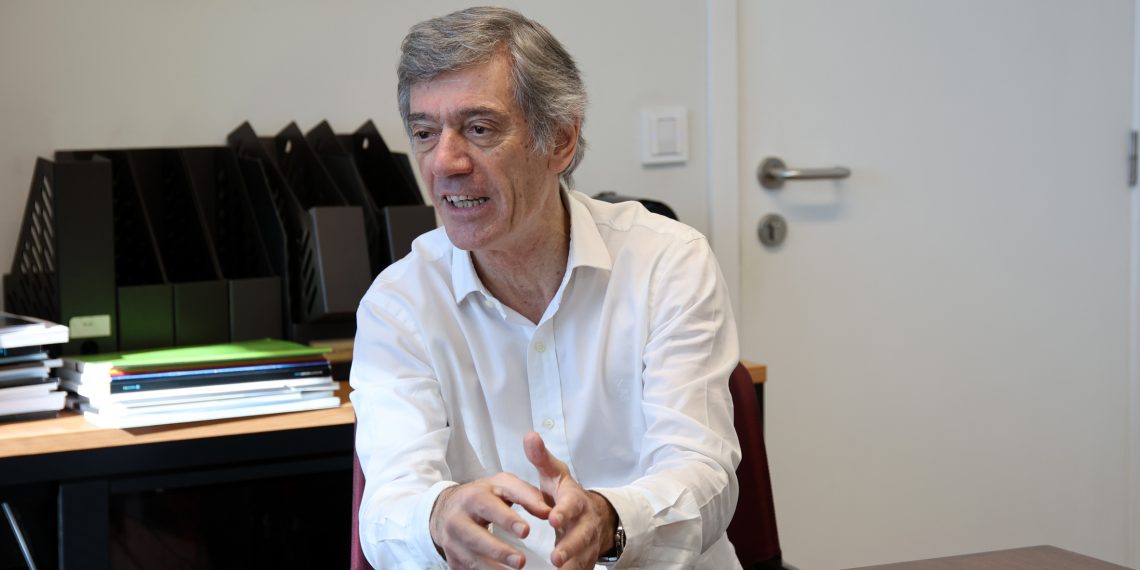I never cease to wonder why so many aphorisms and clichés persist as highly useful analytical tools, even in a volatile and unprecedentedly complex context. “To reflect on the past in order to understand the present and imagine the future” is a thought attributed to the Greek Herodotus, whom Cicero called the father of history, and one I find inescapable in this “month of Camões.”
As part of the celebrations of its 40th anniversary and the launch of INESC TEC Ocean, INESC TEC took on the challenge of organising an event on “Camões, the Sea and the Portuguese Technology and Science.” The goal could not have been more successfully achieved. What we learned from our colleagues – researchers in history, cartography, and 15th and 16th-century shipbuilding – about the Portuguese discoveries not only questioned what we thought we knew about the subject but went far beyond.
Camões, adventurer and greatest poet, glorified in verse the feats of Portuguese navigators clearly highlighting their exceptional nature right at the beginning of Canto I of “Os Lusíadas”:
… Por mares nunca dantes navegados
Passaram ainda além da Taprobana,
Em perigos e guerras esforçados
Mais do que prometia a força humana, …
I wouldn’t dare translate our greatest poet, but you should know that he writes: ”seas never before sailed”, “strenuous dangers and wars”, and also “More than human strength could promise”.
We learned that it was scientific knowledge and meticulous planning that supported this massive endeavour, not mere chance or luck – the patronising explanation given by some English for the success of a country they considered modest. It was a success built upon the navigation arts of Italians and northerners who, for centuries, had travelled the Mediterranean, the Baltic, and the North Sea. As Newton would say much later about his own scientific discoveries, Portuguese navigators stood “on the shoulders of giants.”
Knowledge was systematically acquired. Everything related to each sea trip – navigation, weather, flora, fauna, and the uniqueness of distant peoples – was carefully recorded and later used to improve subsequent expeditions. All information was delivered to the kingdom’s chief cartographer to update sea charts and use that knowledge to enhance the training of future pilots. Science and knowledge were not confined to the King´s court: mathematics, physics, and astronomy enabled innovation in the design of fast and agile caravels, open-sea navigation across vast oceans, and more effective cannons, which the Portuguese brought from the deck down to the waterline of warships. The kingdom’s first chief cartographer was Pedro Nunes, a mathematician recognised among the greatest in Europe at the time.
Portuguese leadership in the art of seafaring was acknowledged in contemporary writings by Spaniards, Dutch, and English. The unique feat of Fernão de Magalhães – his open-sea voyage across the world’s largest ocean – was only possible thanks to his Portuguese mastery of maritime knowledge. At that time, the kingdoms of Portugal and Spain had already dared to divide the globe between them in terms of lands to be discovered and corresponding trade routes.
After the height of an empire stretching through Africa, India, Brazil, and the Far East, the people and the nation who had been nearly two centuries ahead of their time in seafaring faced commercial, economic, and political decline. They missed out on the Industrial Revolutions of the 18th to 20th centuries, failed to achieve stability in the First Republic, and fled forwards into Salazar’s dictatorship and colonial wars.
The strategic role of the sea disappeared with the fall of the empire, except perhaps in traditional fishing and little more. The role of science almost vanished entirely, and by the second half of the 20th century, Portugal had become a country dependent on colonial trade and traditional agriculture.
Portugal’s adherence to the European Community in 1985 – more than five centuries after Prince Henry founded the School of Sagres – brought a new impetus for development that offered science a renewed opportunity. During these forty years, which INESC TEC now celebrates, many Portuguese researchers seized that opportunity with determination, and Portuguese science earned international credibility and recognition – before the country’s economy and its export of goods and services had done so.
For decades, the Portuguese sea has been repeatedly cited by politicians and journalists as a national priority, yet it never truly became one. More pressing concerns always took precedence, and the major maritime projects were continuously postponed.
Today, the sea holds a crucial role globally, and its strategic value is beyond dispute. This is even more true for Atlantic-facing Portugal, strongly connected to the so-called Global South through one of the most spoken languages in the world. Oceans regulate the climate by absorbing 90% of the excess heat caused by human activity, capture 25% of CO₂ emissions, harbour 80% of the planet’s biodiversity, and produce 50% of the oxygen. For Portugal, the sea offers renewable offshore energy, protein from fishing and aquaculture, privileged access to European and global logistics routes, and perhaps in the future, access to biological and mineral resources in the deep sea within its vast exclusive economic zone.
Alongside the consensus on the strategic value of the oceans, there is a broad agreement on the delicate balance of marine ecosystems, and on that nothing can be done at sea without the support of science. The challenges of the sea are challenges of science and, to face them, the country needs – just as it did 550 years ago – bold visionary leadership, thoughtful organisation and planning, the best of knowledge and talent, strong and innovative institutions, and alignment of public and private funding. Nothing less than this will suffice if we are to harness science to successfully tackle many of the great challenges of our time – and secure the future.
By José Manuel Mendonça, INESC TEC director and former president



 News, current topics, curiosities and so much more about INESC TEC and its community!
News, current topics, curiosities and so much more about INESC TEC and its community!